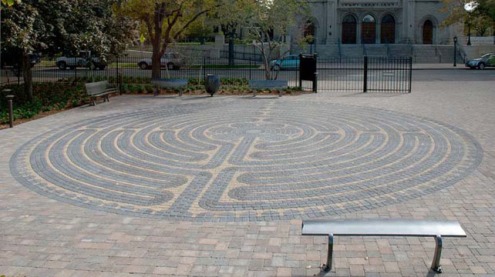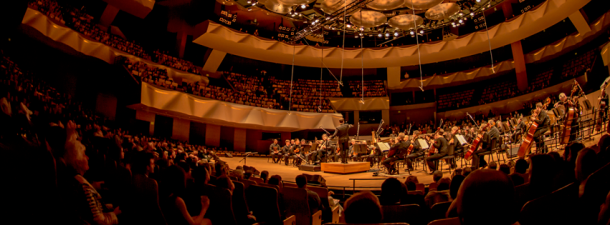On Christmas Eve, between services I had a bit of a break. I was going in search of water, robed in my plain purple cassock, when a lady from the previous service’s congregation spotted my official-looking attire and asked for directions to the Cathedral’s labyrinth. Armed with my years of Tattered Cover bookselling training, in which you always escort and never simply point, I guided her across the street to the courtyard where the labyrinth lay. By that time her husband and two college-age daughters had caught up with us, and I showed them the entry to the path. “So, how does this work, exactly? Isn’t there something spiritual about this that we have to do?” The lady asked quietly as I turned to go. “You know, I’ve got a few minutes. I’ll walk with you,” I decided out loud. I adore labyrinths, and studied them extensively during my undergraduate work in medieval history. How could I resist a quick turnabout? I instructed them to clear their minds of all thought and concentrate on their breathing and the movement of their footsteps, and to be a casual observer to any thoughts that happened to float by.
For the next ten or fifteen minutes the five of us silently walked in broken circles, sometimes almost walking shoulder to shoulder, sometimes briefly passing as we turned and turned. When I arrived in the center of the six-petaled floret, the distinctive design marking the labyrinth as a replica of the one embedded into the floor in Chartres, France, I positioned myself on top of one of the petals and waited for the others to finish, hoping they would follow my lead and stay in the center with me. They did, and each one stood silently on a circular petal until the last daughter came into our circle. They all looked up and a collective sigh and smile was released. I waited for them to speak, and then asked if they had any questions, or if they wanted to share any of the thoughts that came up while they were walking. I explained the history of labyrinths, talked about their meaning and purpose. I told them about how labyrinths were a form of pilgrimage and meditation for medieval people, and how labyrinths can be found all over the world, in all eras, countries, and cultures. Then I talked about what the labyrinth means to me, how I find it such a perfect metaphor for life. “Wasn’t it interesting to notice that sometimes we were walking together, perhaps only for a moment, or perhaps for a while? Isn’t that so much like life? You meet people, you love people; sometimes it’s just a brief encounter, sometimes they’re with you for the long haul.” I described for them how walking a labyrinth reminds me that I am living my best life, even when it seems like everything is going wrong. “You have your goal in mind, right? Your idea of how life is supposed to play out. You have your hopes for the ultimate happiness, and ideas of how to achieve it. But then life takes you wandering off somewhere else and you say, ‘how did I get here? Wait a second, this isn’t where I’m supposed to be! I wanted to be a lawyer, why am I working in this coffee shop? What does this misery have to do with my happiness?’ But you have to trust that there is just one path, and it will lead you to your center, and that the way to the center is to walk through all the bends, and be carried far off from your dreams, so that you can lead a fulfilled journey and be whole when you arrive.”
Short of time (and needing to prepare my music for the next service), I bid our parishioners good night, after we talked and shared and listened to the buzzing cold quiet of the Christmas Eve night amid the city hum. As I walked back to church, I felt the chilled wool hems of my cassock flapping against my calves in the wind, and thought that this must be how it feels to be a priest: to see questions and troubles in the eyes of others, and to be able to bring peace and understanding to their minds, even if just for a moment.
I have had several such moments, in which I feel a spiritual beckoning to be a minister of some sort. I can see myself being filled with the joy and awe of opening and revealing the light of God before a group of people; for some of whom, that moment may be their awakening.
For church musicians, it can often become just a job, musical work that happens to take place in a church. You go, you sing, you play, you stand, you sit, you kneel, you stand again, and then you leave and go to brunch and collect your paycheck. I’ve been there. I’ve punched my clock in churches filled with negative, hateful vibes, churches who prioritize damning over deepening. When inequality is preached at the pulpit, the vocation of sacred music devolves into an unpleasant but necessary obligation, a hard-to-swallow source of income.
But I work in a special place now. A place where women consecrate the Host. A place where two men thread rings on each others’ left hands and joyfully, justly, allow God into the full presence of their holy union. A place where children sit squirmingly, wigglingly at the feet of the altar during the holiest part of the Mass. A place that is full of tradition, dignity, reverence, and honor. I work in a place that won’t demand that I sacrifice my love of justice to remain silent in the face of prejudice, but a place which will echo at the pulpit the cries for equality that resound in my head as I sit and stand and kneel. That’s not to mention that the music program is among the best in the country, so that I go to work feeling challenged, feeling respected and valued, and feeling called to grow and flourish as the best musician I can be.
In a place such as this, I, who have felt called before, am empowered to fulfill the role of musical minister that my job description asks of me. I can truly be a choral vicar at this Cathedral, so that the vestments I wear can be an authentic testament to my work in ministering to the spiritual life of the community. Whereas at former gigs the heaviness of moral oppression compelled me to simply punch my clock, this Cathedral has compelled me to enliven my ministry by extending the reach of the choir stalls and leading meditation in the labyrinth (off the clock, I might add).
The entire Christmas Eve experience was uplifting and joyous, but even the ringing of the brass and the mighty exclamations of the wide-open pipe organ could not achieve the awesomeness of walking that quiet stone path in the frigid midwinter darkness with those strangers; and hopefully, changing the course of all our lives, with yet another gentle loop towards the ultimate grace.

